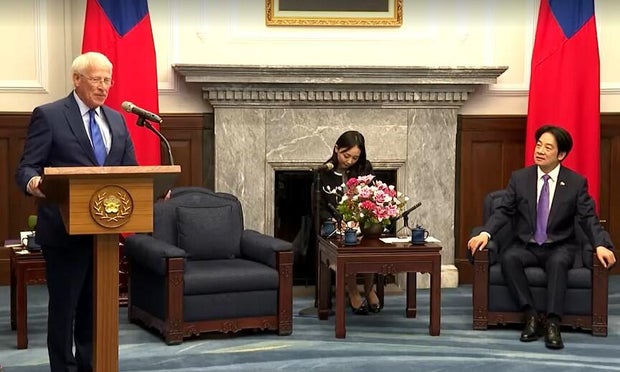In a significant development that underscores a complex interplay of global trade, military, and diplomatic relations, U.S. Senator Roger Wicker, the head of the Senate Armed Services Committee, has emphatically reiterated the United States’ commitment to Taiwan, emphasizing the enduring friendship and common values shared between the two. His comments came during a notable visit to Taipei, accompanied by fellow Republican Senator Deb Fischer, amid ongoing and tense trade negotiations between the U.S. and China.
The visit, which took place over two days, comes at a crucial juncture as President Trump aims to finalize a trade agreement with China—a country that views Taiwan as part of its territory and has not shied away from expressing intentions to use force for reunification if necessary. The arrival of the American senators was met with immediate criticism from China’s Foreign Ministry, which firmly rejected any official U.S.-Taiwan exchanges, thereby reasserting its longstanding position on this sensitive issue.
During a news conference along with Taiwan’s President Lai Ching-te, Senator Wicker conveyed a powerful message from the U.S. Congress, stressing long-term friendship and reaffirming the right of Taiwan, as a free nation, to preserve its self-determination and maintain its sovereignty. These remarks were made in the Presidential Office in Taipei, capturing significant media attention and perhaps indicating an unyielding support from U.S. legislative bodies towards Taiwan.
China’s response was swift and stern. Following Senator Wicker’s statements which were widely publicized, including descriptions of Taiwan as a free country, China’s Foreign Ministry issued a statement expressing “strong dissatisfaction,” reiterating that Taiwan’s future is to be determined by all Chinese people, including Taiwanese. The Ministry emphasized that China’s reunification was inevitable and warned against the potential implications of such high-profile visits which it views as violations of the one-China principle, a cornerstone of diplomatic relations established through joint communiqués between the U.S. and China.
While the U.S. administration under President Trump maintains its recognition of the one-China policy, the visit by the senators points to a more nuanced stance within American politics, where Congressional actions reflect a robust support for Taiwan. This is further underscored by past dealings under the framework of the Taiwan Relations Act, the three Joint Communiqués, and the Six Assurances which guide U.S. policies regarding Taiwan.
On the ground in Taipei, Senators Wicker and Fischer’s discussions with Taiwanese officials focused broadly on security, trade, and mutual cooperation. Senator Wicker specifically highlighted the strategic importance of Taiwan in the Asia-Pacific region and expressed a firm resolve to ensure Taiwan’s capacity to defend its freedoms and sovereignty. This involves bolstering military cooperation and enhancing engagements with the defense industry—actions that symbolize a deep commitment to Taiwan’s autonomy.
Furthermore, the visit comes at a time of heightened anxieties in Taipei, stemming from uncertainties about the robustness of the U.S.-Taiwan alliance amid potential threats from China. Recent military maneuvers by China, involving large-scale exercises close to Taiwan, have only escalated these concerns, spotlighting the island’s strategic yet vulnerable position.
Adding another layer to this geopolitical puzzle, the Trump administration’s broader international stance, featuring a global trade war and pressure on allies to boost defense spending, has complicated U.S.-Taiwan relations. These complexities were exemplified recently when President Lai’s planned U.S. transit—for a trip to Latin America—was reportedly blocked following objections from Beijing, highlighting the delicate balancing act facing global powers in the region.
The economic dimensions are equally challenging. As trade negotiations linger, Taiwan faces pressure from newly imposed U.S. tariffs, raising alarms among its export-dependent manufacturers. In response, Taiwan is strategically bolstering its defense budget to potentially exceed 3% of its GDP in the coming year, reflecting a clear strategy to enhance its self-reliance amidst growing regional tensions.
Senators Wicker and Fischer’s tour in the Asia-Pacific region, including stops in key strategic locations like Hawaii, Guam, Palau, and the Philippines, prior to their Taipei visit, underscores a broader U.S. strategy to reinforce its presence and commitments in the region, possibly as a counterbalance to China’s growing influence.
In conclusion, the senators’ visit to Taiwan is not a mere diplomatic formality but a profound declaration of strategic support and solidarity in a complex international theater characterized by fluctuating power dynamics and evolving alliances. It highlights the multifaceted nature of international relations where military, economic, and diplomatic elements intersect, shaping the policies that govern the interactions between nations on the global stage. As such, the outcomes and continuations of these policies will be critically observed by the global community, awaiting to see how the intricate dance of diplomacy plays out in this significant segment of the Asia-Pacific.









